Obviously, washing the dishes by hand is no fun at all. No one wants to spend countless minutes slaving away at the sink right after enjoying a delicious meal. A dishwasher can be used to take on the task instead, freeing your time up to enjoy the more important things in life!
But a dishwasher is only ever as good as its owner! To make full and effective use of a dishwasher of your own, you’ll need the right knowledge. Luckily, our Reliant tech experts have a wealth of knowledge on dishwashers, and they’re here to lend it to you! This guide will take you through everything there is to know about dishwashers, so you can truly master this nifty piece of kit!
What Makes A Good Dishwasher?
You don’t need us to waste time telling you what a dishwasher is. Instead, we’ll kick off this guide by finding out what separates a good dishwasher from all of the rest! When you’re in the market for a dishwasher, it can often seem impossible to find that one perfect model. How are you supposed to know what makes one model better than another? We’d recommend looking for the following characteristics!
A Good Energy Rating
Even today, dishwashers are considered by many to be a luxury. This is because, for the longest time, they’ve had a reputation for consuming excessive amounts of electricity. As such, one of the first things you’re likely to consider in a dishwasher is the amount of energy it consumes.
Luckily, dishwashers aren’t quite the rampant energy consumers they once were. In fact, you can actually find a number of models that are incredibly efficient. In order to find these models, you’ll need to consult the energy rating label attached to each model. This colour-coded rating system allows you to quickly glean just how much energy a specific model uses. A model rated at “A” is considered to be the most efficient, while a model rated at “G” is considered to be the least efficient.
It’s worth looking for an A-rated dishwasher. You can count on it to use less electricity, which in turn will save you money on your bills. They may cost more upfront, but they’re worth every penny!
We’d recommend looking at models that rank closest to “A” whenever possible. In some cases, they may cost a little more, but they’re worth the investment! You’d save a lot more on your energy bills in the long run!
Eco Mode
In order to be truly energy-efficient, a good dishwasher should have some kind of eco mode available. These modes are specifically programmed to use less electricity and water, for the purposes of saving money and minimising the impact on the planet.
Eco mode uses cooler water, which in turn uses less electricity. It takes a little longer to finish the job, but this ensures that the slightly cooler water can still provide a full clean. While you might need to plan your dishwasher tasks accordingly, it’s totally worth using!
Sufficient Capacity
When you’re considering the efficiency of a dishwasher, you’ll naturally be led to consider the size of the unit. The two factors can have a direct impact on one another. Of course, you’ll need a dishwasher with enough space for all of your dishes. If you buy a dishwasher that’s a few sizes too small, you’ll have to perform more washes, which results in more energy consumption. However, if the dishwasher is too large, and you can’t fill it sufficiently, you’ll be putting the water to waste!
It’s worth taking the time to consider efficiency and dishwasher size. A dishwasher that consumes 1.5kWh per wash, and has a greater tub size, would be considered more efficient than a tiny dishwasher that consumes 1.2kWh per wash.
Sensors
Many modern dishwashers come with unique sensors that can detect how many dishes are placed in each of the racks, and how dirty they are. The information from these sensors can then be used to inform the cleaning job and improve efficiency.
Load sensors are able to detect the number of dishes that have been loaded into the racks. Depending on how much weight each of the racks carries, the amount of water that is used by the dishwasher is altered. This means that if you do end up slightly underfilling your dishwasher, it won’t result in a load of water being put to waste. Only the amount that’s needed is ever used!
It’s worth looking for smart features that can improve the efficiency of your dishwasher. Load sensors and soil sensors can ensure that there is never too much water being used.
Soil sensors are incredibly useful, as they can determine just how dirty your dishes are. Within the bottom of the tub is a small reservoir where water and soil are collected as your dishes are washed. An LED light on one side of the reservoir emits a small red light that is sent toward a sensor on the opposite side of the reservoir. When the reservoir is filled with soiled water, the light won’t reach the sensor. When light does reach the sensor, however, it communicates to the dishwasher that the dishes are clean, and that the cycle can end early.
Both of these sensors can save you boatloads of cash!
Different Cycle Types
Sometimes, different dishwasher loads require different washing cycles. As such, you’ll want to find a dishwasher that allows you to choose from a selection of cycle types. With more choice in cycle types, it’s easier to find the perfect washing settings for any specific item.
Simple Controls
Of course, in order to activate any of the different cycle types, you’re going to need to interface with the dishwasher itself. As such, you’ll want to find a unit with simple and intuitive controls. If you just need a simple dishwasher, then opt for one with simple button controls, so you can quickly get a cycle going whenever you need.
If you want to wash all kinds of different things, then a dishwasher with a touch-screen interface is also a great idea. These are intuitive and simple to use, and allow you a greater sense of control.
Drying
It’s easy to overlook the importance of a good drying function in a dishwasher. When your dishes are dried shortly after washing, you can more quickly unload them after a cycle has ended. Most dishwashers come with the ability to dry dishes, but some do it much better than others.
A dishwasher that can dry your dishes is incredibly useful. You’ll be able to unload your dishes quickly, without worrying about pulling soggy dishes from any of the two racks!
We’d recommend looking for different drying functions. For instance, the heat-dry function pumps hot air around the tub after a cycle, to effectively dry dishes. An air-dry function, on the other hand, opens the door of the dishwasher slightly, to allow hot air to escape, and allow the dishes to dry using the air in the room. This uses much less electricity, and ensures the dishes are cool when it comes time to unload them!
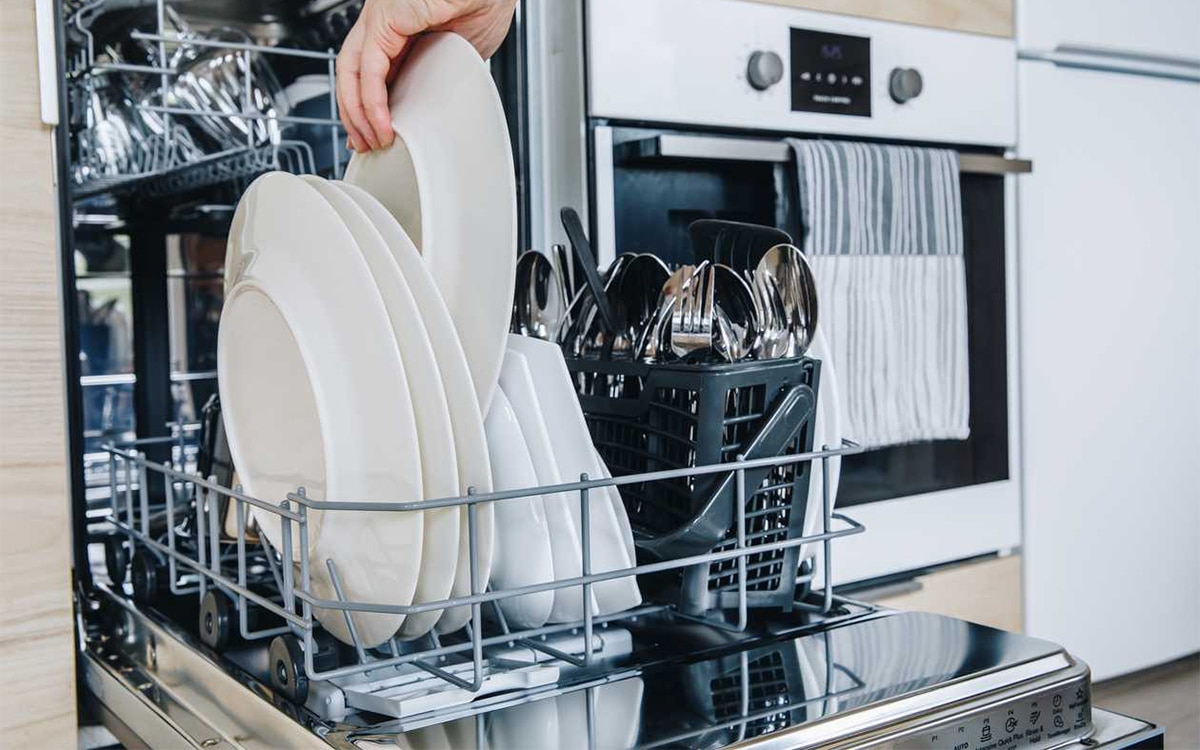
Do You Need To Rinse Dishes Before Loading Them?
It was simply inevitable that we would address this question at some point. For as long as we’ve had dishwashers in our homes debates have long raged over whether there’s any need to pre-rinse dishes.
For the sake of brevity, we’ll say that you actually don’t need to pre-rinse your dishes. Modern dishwashers are fully capable of dealing with even the messiest of plates. Pre-rinsing your dishes before putting them in the dishwasher is simply a significant waste of money!
When dishwashers first entered homes across the UK, it was necessary to rinse dishes ahead of loading them. This is because older models were simply less efficient and less capable of dealing with mess. Even the smallest amount of food could end up blocking the drains. Now, dishwashers are designed to filter out food waste so it doesn’t run the risk of blocking your drains.
Despite what you might have been told, there’s actually no need to pre-rinse dishes before loading them into a dishwasher! Doing so simply wastes water. A modern dishwasher can easily handle even the messiest dishes!
Rinsing your dishes before placing them in the dishwasher is just a waste of water. Your dishwasher can do the job for you, which makes the job of pre-rinsing totally unnecessary!
Instead of rinsing large pieces of leftover food, it’s best to simply scrape those pieces of food into the bin.
Should A Dishwasher Be Professionally Installed By A Plumber?
Moving a brand-new dishwasher into its spot in the kitchen is never easy. For one thing, dishwashers are incredibly heavy. Without the right equipment, you could find yourself straining your back trying to move it into place, or even damaging your kitchen floor. As well as that, installing a dishwasher fully requires a degree of specialised knowledge. An insufficient dishwasher installation could lead to thousands of pounds in damage to your kitchen!
If you want your dishwasher to be installed fully and safely, we’d recommend contacting a plumber. A plumber will have all of the specialist knowledge necessary to ensure that your new dishwasher is fully hooked up to your home’s water supply.
While the cost of hiring a plumber might add a little bit extra to your budget, it will prove worth it. A secure dishwasher will last you for years to come. So you won’t need to buy a replacement unit anytime soon!
Should A Dishwasher Be Installed Near Your Kitchen Sink?
It’s not a complete necessity to have your dishwasher installed directly beside your kitchen sink. However, in most cases, it’s the most convenient option.
As we mentioned just above, a dishwasher needs to be hooked up to your home’s plumbing. This means that the dishwasher needs access to the water supply and to the drainage system. When a dishwasher is installed next to a kitchen sink, it can simply make direct use of its existing connections to both water supply and drainage!
However, if you wanted, you could absolutely situate your dishwasher away from the kitchen sink. You would simply need to ensure that the dishwasher can connect to your home’s plumbing. If you have a spot with access to it, then it’s as simple as connecting it. If your chosen spot does not provide access to the plumbing system, then you will need to contact a plumber to assist you in routing the plumbing towards that chosen spot. Keep in mind that this can be quite a costly project!
Do You Need An Electrician To Help Install A Dishwasher?
If you’re replacing one dishwasher with another, you can simply slide the new one into place and plug it directly in. However, if you are placing your dishwasher in a new spot in the kitchen, we’d recommend consulting an electrician.
If you’re placing a new dishwasher into a new spot, you’ll want to contact an electrician to ensure it’s sufficiently installed. This keeps you and your dishwasher safe moving forward!
An electrician can ensure that your dishwasher is safely connected to your home’s power supply. It’s important to ensure it’s done fully and safely for your own protection!
You’ll also need to make sure that your dishwasher is connected to its own power circuit. This ensures that the power used by a dishwasher is not shared with any other device. This prevents overloading and overheating, which keeps you and your dishwasher safe!
Do You Need To Add Salt To A Dishwasher?
Of course, simply dropping your dishes into the dishwasher and setting a cycle off isn’t enough to leave your dishes looking sparkly clean. Water alone simply won’t be able to get the job done. You’ll also need some detergents to really cut away some of the stubborn stains and caked-on dirt. These detergents can take the form of powders, tablets, and liquids that you simply add to the machine before beginning a cycle.
Dishwasher salt is another item that many people drop into their dishwashers between every cycle. But if you’ve yet to ever use dishwasher salt before, you might wonder why anyone would use it.
Generally, dishwasher salt is intended for use in a home with a hard water supply. Hard water has a high concentration of limestone within it. Limestone is not harmful to consume, but it can have a direct negative impact on your dishwasher. The high levels of limestone in hard water keep detergents from fully activating and then dissolving at the end of a cycle.
Dishwasher salts are designed to soften the water by eliminating limestone. This allows detergents to work at their best even when using hard water. It helps to prevent your dishes from coming out dirty and keeps streaks from appearing!
Leaving limescale to run rampant in your dishwasher can actually do a lot of harm to the unit itself. Limescale can gather up in the pipes, and cause blockages that keep the dishwasher from accessing water, or draining waste!
What Items Should You Not Put Into A Dishwasher?
Sometimes, it can be unclear what exactly can and cannot be placed safely into a dishwasher. Rumours still prevail about what items are or are not dishwasher safe. Below are some of the most important items that you should never place in a dishwasher!
Wooden Items
When wood becomes wet, it expands, as water is absorbed. Heat is also known to warp and render wood. So, when high moisture and high temperatures combine in a dishwasher it can spell disaster for any wooden objects. Wooden spoons, wooden cutting boards, or just about anything with wood, should be kept far away from the dishwasher.
Wood absolutely should not be placed in the dishwasher. Hot water can cause wood to warp and crack, leading to very permanent damage! Instead, wash wooden items by hand with soapy water.
When placed in the dishwasher, wooden items run the risk of cracking and breaking beyond repair!
Specific Plastics
If you’re unsure about placing a plastic item into the dishwasher, you should be sure to carefully inspect it. Dishwasher-safe plastics are clearly earmarked with a “Dishwasher safe” label. If a plastic item doesn’t have this label, it should not be put in a dishwasher. This is because the plastic could warp or melt, wreaking absolute havoc on your dishwasher!
Non-Stick Pots And Pans
The non-stick layer coated over these products can very easily be chipped away by the force of the hot water of a dishwasher. Not only could this pose a very real threat to your dishwasher’s internals, but it would also necessitate buying a brand-new set of pots and pans! Save yourself the money, and wash these by hand!
Anything Delicate!
If you’re ever in doubt about washing a specific item, we’d recommend erring on the side of caution. Family heirlooms, precious antiques, and fine china, in particular, should never be placed into the dishwasher. These items can very easily be damaged by the extreme dishwasher conditions.
If you’re ever in doubt about placing anything in the dishwasher, it’s best to just wash it by hand. This way you don’t run the risk of damaging anything that’s precious or valuable to you.
Crystal goods, in particular, should not be placed in the dishwasher. The hot conditions can result in a cloudy texture being rendered on their surfaces!
Anything Outside The Kitchen
Really, your dishwasher should only ever be used to clean items that belong in the kitchen. Most kitchen items are specifically designed to be able to withstand the conditions created in a dishwasher. As such, items that don’t belong in the kitchen run the risk of being damaged.
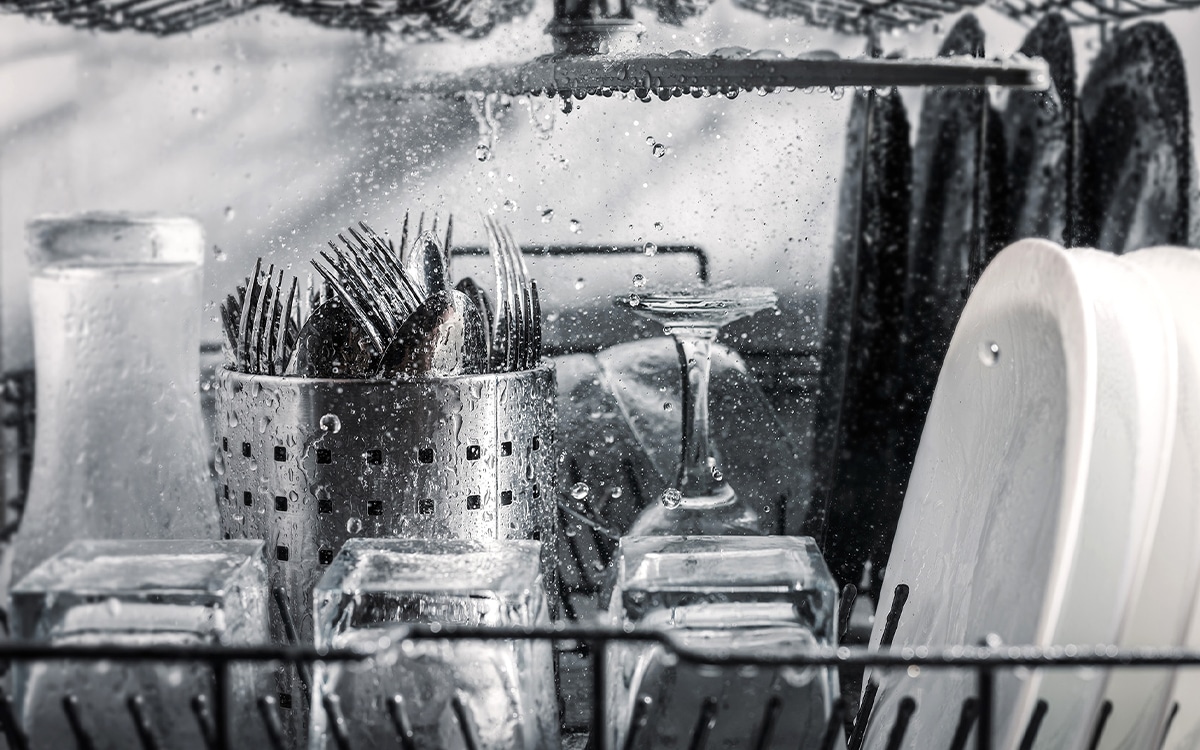
How Do You Load A Dishwasher?
There’s only so much space available in a dishwasher, so you’ll want to be sure to use every inch properly. Luckily, this is very easy by simply following the general shape of each of the dishwasher racks.
Specific sections of each dishwasher rack are intended for storing specific items. For instance, the pronged section found on the bottom rack is designed to hold your plates upright. It’s generally best to place items into their designated spaces so that the dishwasher can work at its best! The bottom rack is great for larger items like bowls, plates, and baking trays.
The top rack is best for your smaller items, such as small bowls, mugs, cups, and tiny dishes. When loading these items, it’s best to put them upside down. So, when inserting a bowl, you should make sure that the mouth is face down. This ensures that water doesn’t get trapped!
You also need to be careful to never overfill your dishwasher. Overfilling your dishwasher makes it difficult for water to travel around the central tub, which in turn results in an unsatisfying and unfinished clean. Unfortunately, overfilling your dishwasher is very easy to do!
You’ll know you’re overfilling your dishwasher if you have to stuff things into place. If a dish doesn’t feel like it naturally fits into place, or it hugs too tightly to another, then you are overfilling!
When Should You Empty A Dishwasher?
Adding to the pool of misinformation surrounding dishwashers, it’s often hotly debated when exactly you should withdraw dishes.
Experience has shown us that it’s best to allow your dishes to rest for around an hour before withdrawing them from the dishwasher. Simply crack the door open slightly, and allow fresh air to reach the dishes. This helps to dry up those remaining drops of water and cools the dishes down.
We’d recommend leaving your dishes for around an hour before unloading them. This gives them time to dry and cool down. Just don’t leave them there for more than 24 hours!
However, we’d recommend against leaving your dishes in the dishwasher for too long. In fact we’d recommend you empty it within 24 hours of the cycle ending. This helps to prevent bacteria from building up thanks to the warm and moist atmosphere of the central tub.
Should You Leave A Dishwasher Door Open After Use?
Between every dishwasher cycle, we would recommend that you leave the door open slightly. The reason for this is that it helps to keep the dishwasher clean and free of bacteria. Even between uses, small amounts of water will stick around in the tub of your dishwasher. Leaving the door open allows this water to evaporate, and also keeps the central tub cool. This prevents bacteria and mould from developing.
When bacteria and mould are left to propagate in your dishwasher, it runs the risk of doing great damage to your dishes.
How Much Electricity Does A Dishwasher Consume?
As we mentioned earlier, dishwashers have long had a negative reputation as rampant energy guzzlers. However, innovations in dishwasher design have made them more efficient and effective than ever.
Nowadays, most average dishwashers only consume around 1.2 kWh for every laundry load. The least efficient models tend to consume around 1.5 kWh or more, up to around 2.0 kWh.
Of course, it’s possible to reduce the amount of electricity consumed by a dishwasher by playing around with different cycle types. For instance, a cooler wash, or a much shorter wash may consume much less electricity. Let’s explore this in a little more depth below!
How Can You Reduce The Energy Consumption Of A Dishwasher?
There are actually a few ways to reduce the energy consumption of a dishwasher. Let’s take a look at some!
Use Eco Mode!
As you’ll remember, we talked about eco mode in some detail above! This cycle type is designed to use less electricity by reducing the temperature of the water. To allow cooler water to work effectively, the cycle does take a little longer, at around 3 hours. However, as a result, it uses half the amount of normal electricity and still results in a perfect clean.
Fill It Up!
Making full use of your dishwasher’s racks ensures that not a single drop of water is put to waste. Unless your dishwasher has some kind of weight sensor, half-filling your dishwasher will result in much higher energy consumption, as, in order to wash a full load of dishes, you’d need to run multiple cycles!
Skip The Drying Cycle
If your dishwasher uses some kind of heat-dry system to dry dishes, then we’d recommend skipping it. A lot of electricity is used to pump hot air around the central tub of your dishwasher, so you can save it by skipping the process!
A lot of electricity is used to heat-dry dishes. As such, you can save a lot of energy and money by skipping the process and allowing your dishes to air dry!
Instead, we’d recommend cracking your dishwasher open at the end of the dishwasher cycle to allow dishes to air dry. This also helps them to cool down so they won’t burn your fingers when you attempt to unload them.
How Much Water Does A Dishwasher Use?
Much like with electricity, it’s really easy to assume that dishwashers use up a lot of water with every cycle. However, dishwashers don’t actually consume all that much water! A modern dishwasher will normally use around 9 litres of water for every cycle. This is much less than older dishwashers that often had to use upward of 20 litres for every cycle!
Dishwashers actually use less water than you would use washing dishes by hand! Even filling up the sink and soaking your dishes would still result in more water consumption than a dishwasher when washing a full dishwasher’s worth of dishes!
How Long Do Dishwashers Last?
Much like any other appliance in the home, a dishwasher can easily last upward of 10 years with proper care. It usually takes around 5 years for some of the first problems to manifest in any dishwasher.
To help your dishwasher to last this long, you’ll need to take good care of it. You’d need to ensure you load it properly, avoiding overfilling, and keeping its water supply and drainage pipes clear of waste. If your area has a hard water supply, you’ll also need to make frequent use of dishwasher salts to keep limescale from developing!
When Should You Replace A Dishwasher?
You should generally replace a dishwasher when the cost of a replacement outweighs the cost of repairs. Repairing an older dishwasher is incredibly costly. As such, if your dishwasher is close to 10 years of age, and is acting up, then it might be best to replace it.

Frequently Asked Questions
What Makes A Good Dishwasher?
A good dishwasher is able to fully clean all of your dishes, while still reducing electricity usage. Luckily, modern dishwashers are much more efficient than they once were. They consume far less electricity and water on average and even come with a number of specialised cycle types that are programmed to use less electricity.
What To Measure When Buying A Dishwasher?
When you’re choosing the perfect dishwasher, you’ll want to make sure to measure it correctly. Be sure to find out the dishwasher’s width, depth, and height. This ensures that it will fit into place, without running the risk of vibrating off of any other items in the kitchen and creating a loud noise! Make sure to also measure the capacity of the inner tub, so that there’s enough space for your dishwashing needs!

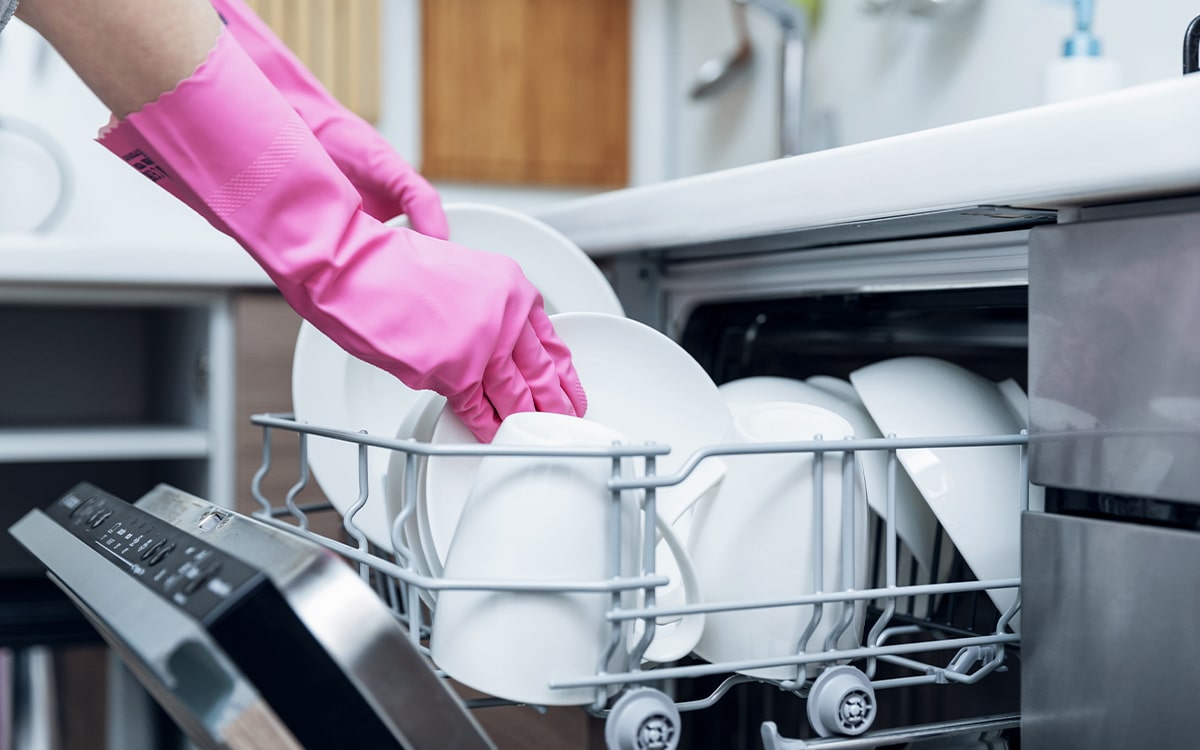

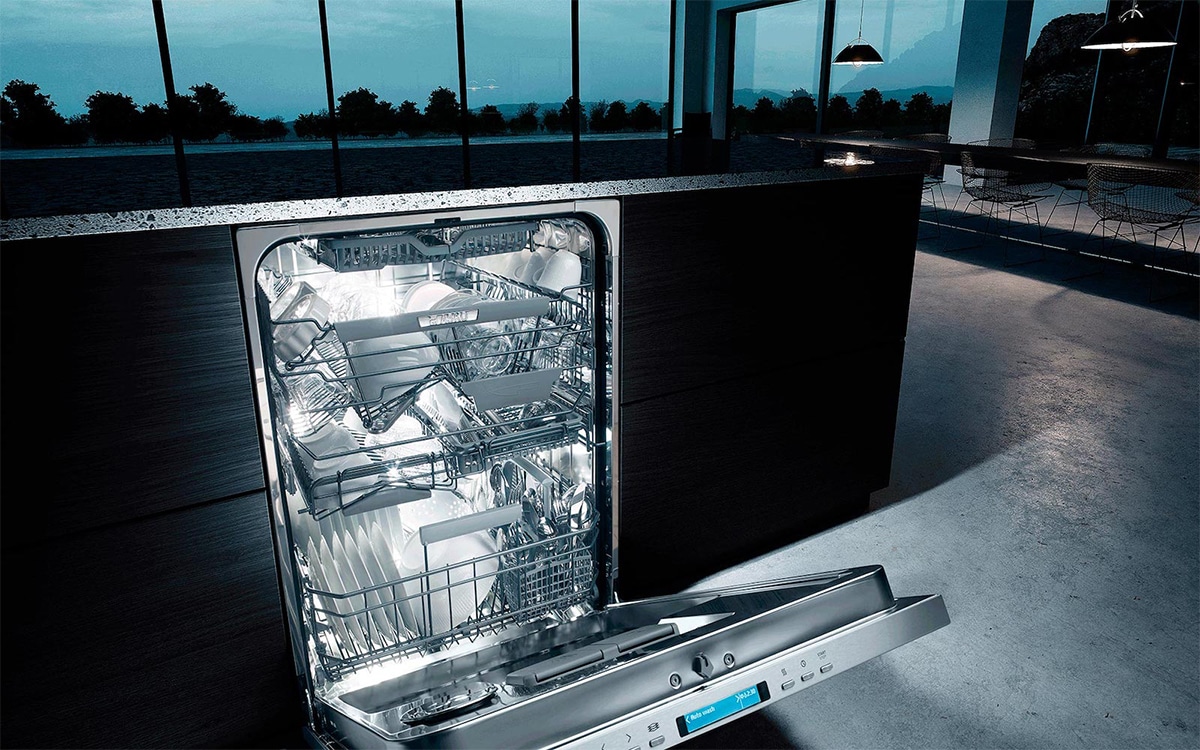

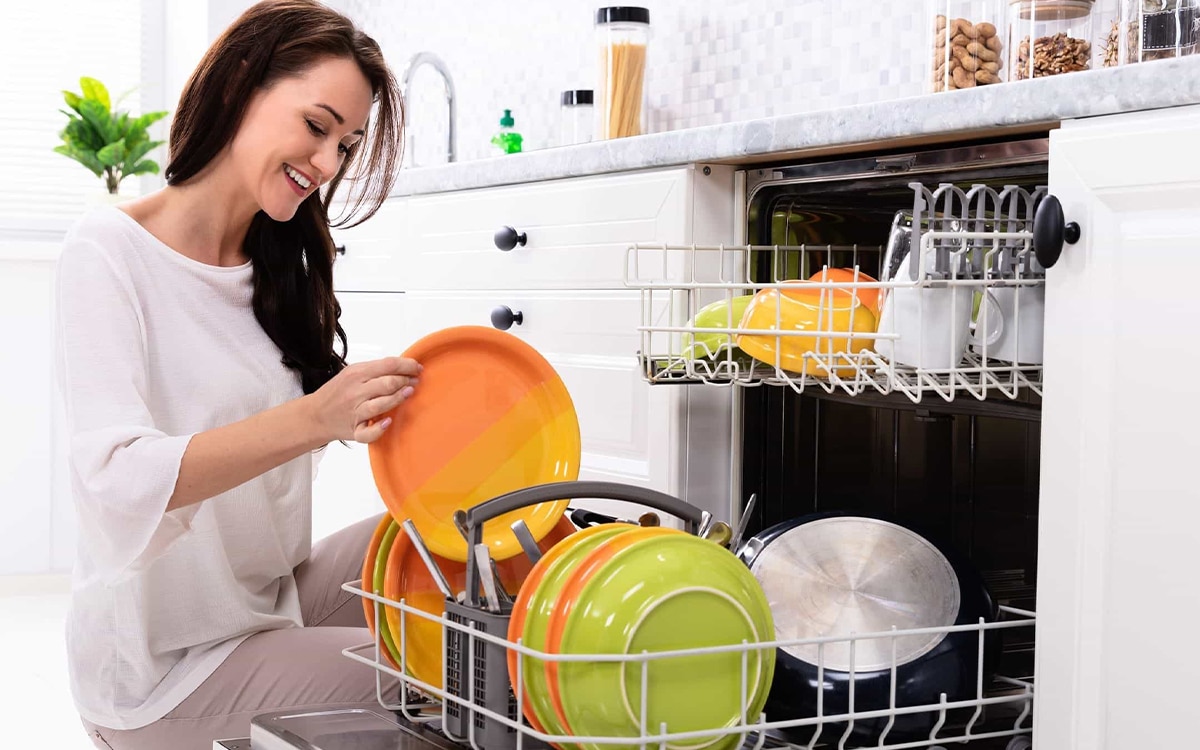
0 Comments